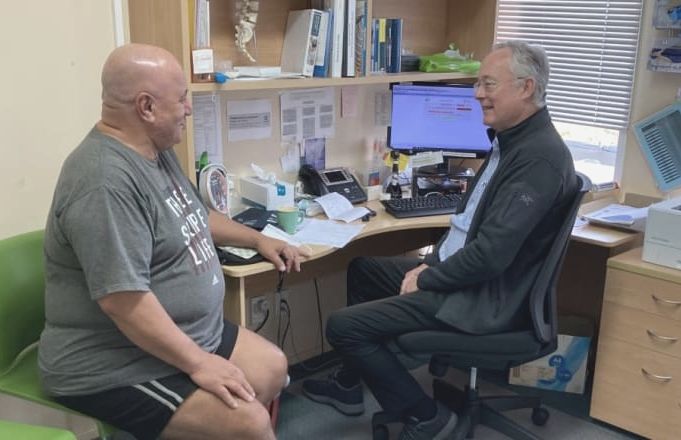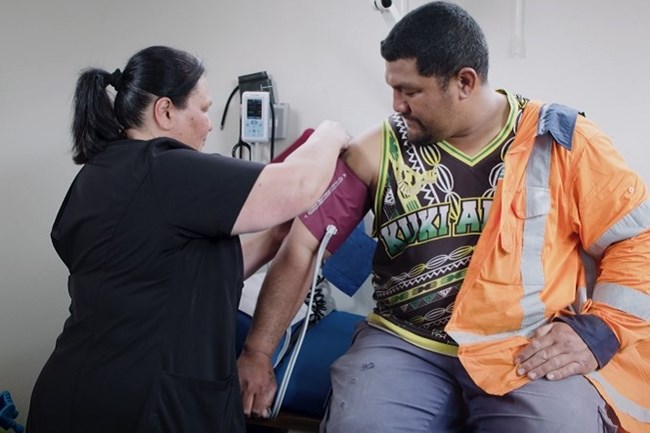However your partner has been suggesting you get a check up, and the boss is encouraging you and your workmates to get one too.
Pressure’s on, then you hear that radio ad for Men’s Health Week and you know there is no escaping. Time for that visit.
So what can you look forward to?
First thing is you don’t need to look forward to a lecture. Your doctor is not your mum.
Instead he or she is actually your partner in the business of keeping you healthy. That’s right, partners. You both have a role in improving and maintaining your health.
It’s important you choose – and yes, you can choose – a doctor that you are comfortable with and trust. Bad vibes are bad vibes, and you don’t need them while pushing down that white coat fear. A doctor’s clinic should be a safe and judgement free place.
Trust makes it easier for you to be fully honest with them (otherwise they can’t do their full job), and medical details you share with them are legally confidential.
The Appointment – before
- It’s likely you will need to contact your doctor’s clinic to book your appointment. If you haven’t been for some time, tell them as they may want to make it a bit longer. Some clinics are open at times that may mean you don’t need time off work to make it.
- Turn up early as there could be some paperwork or admin.
- Before you head to the doctor, it’s a good idea to know both your own health history and that of your family. What illnesses your nearest and dearest have had may help your doctor put some things in context.




The Appointment – checking you out
- If you’re a long absent or first time visitor, the clinic will want to record your details (measurements, blood pressure, easy stand up stuff) and this may be done by a nurse depending on the size or nature of the clinic.
- Remember, these folk do this for a living. They have seen most things and unless you’re growing another head, your problem is not going to be the chat of the staff room.
- When the doctor gets down to the intimate details, remember it’s their job to fix these problems so even if they sound embarrassing, bring them up.
- For example, erectile dysfunction may be an indicator of heart disease or other problems. You are more of a man to bring it up, not less.
- And if your doctor suggests it, having a digital rectal exam to check your prostate is the smart thing.
- It gives you and your doctor the best information and nothing else.
- Don’t hesitate to ask questions and voice concerns as they occur to you during the appointment.
- Often guys want to seem cooperative and not appear pushy or ask what seems like a dumb question.
- Remember, it’s your body and you are the person who needs to understand what’s going on and what’s the plan.
- It’s okay to say to your doctor, ‘Wait, I want to make sure I understand what you’re saying. This is important and I want to get this right.’
- If you are unsure of anything or a little worried, it is cool to bring in someone else who can help you ask questions and ensure you are OK with the examination and what may come out of it.

- Your doctor will want to take samples of your blood and these get whizzed off to labs where they analyse everything from your cholesterol levels to your PSA (prostate specific antigen) which is a powerful indicator for prostate issues.
- Results take a few days and the doctor will advise you more once he/she views your results.
- Your blood tests and other information form a baseline so the next time you get a check up, your doctor can compare your vital numbers and keep you better informed.
- Most times the blood results will show you are all good and the doctor will simply say “I’ll see you again next year mate.”
And all going well, that’s it. Easy huh?
What will this cost?
It’s a real question because cost is a reason many guys don’t get along.
- It’s likely you will pay from $45 – $75 for a consultation. That’s about the same as the $60 average cost of a warrant of fitness for your car.
- Some clinics will charge lots less if they are receiving more government support, usually in areas of higher deprivation. Don’t be afraid to ask about fees and if any other forms of support are available to you.
- The government pays all PHOs a set fee per head annually which is intended to reduce the cost for patients. If you are enrolled but don’t go to the doctor, they still receive this annual capitation fee.
Here’s more information about paying for doctor visits
Finding a doctor
Unless you live really isolated, you potentially have a choice about who you would like to be your doctor. Look for someone you can be open with and who you feel you can trust. It’s not hard to switch doctors if that partnership thing isn’t working for you.
Search for a doctor near you on Healthpoint
Next level – seeing the specialist
Your doctor may tell you that you will need to see a specialist, a fully trained doctor in the particular field of medicine/health.
Some of these specialities require a referral from your GP before you get seen while others such as a physiotherapist, podiatrist, chiropractor or optometrist don’t.


